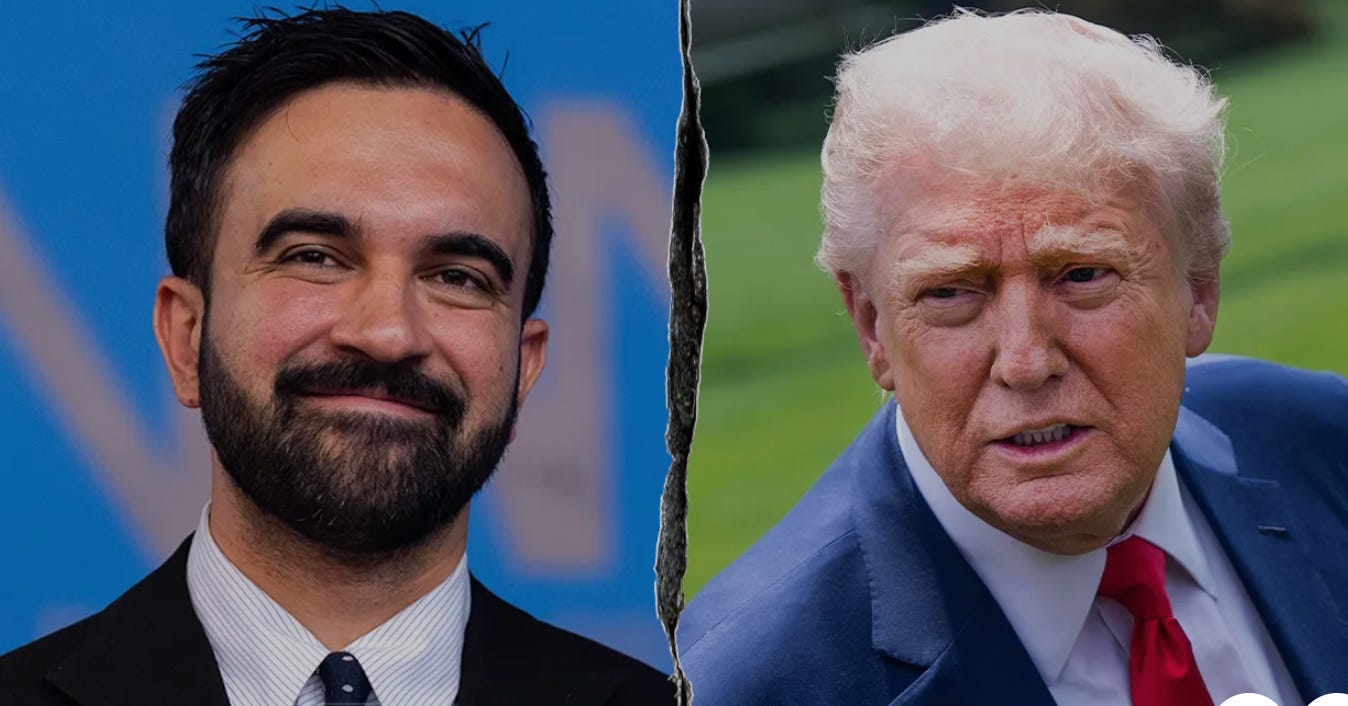DECOLONIZATION AND ITS IMPASSES
The true task is not to squash the pseudo-revolutionary Trumpian energy but to redirect it toward the new techno-feudal masters
Welcome to the desert of the real!
If you desire the comfort of neat conclusions, you are lost in this space. Here, we indulge in the unsettling, the excessive, the paradoxes that define our existence.
So, if you have the means and value writing that both enriches and disturbs, please consider becoming a paid subscriber.
What goes on around the world today? Zohran Mamdani’s victory in New York is the bright exception to the predominant drift toward more and more of the usual. In the Middle East, we get the usual mix of violence and obscenity. Less than a week ago, Maj. Gen. Yifat Tomer-Yerushalmi was the Israeli military’s top lawyer, tasked with enforcing the rule of law within the nation’s armed forces. Now, in November 2025, she is under arrest as part of a criminal investigation into the leak of a video showing the alleged abuse, including sexual abuse, of Palestinian detainees in a notorious Israeli military prison. She wrote:
“There are things that cannot be done even against the worst of the detainees. Officers of the (legal) unit have faced repeated personal attacks, harsh insults, and even real threats. All of this because they stood guard over the rule of law in the IDF – together with the commanders and alongside them.”1
The last traces of dignity are erased from public life in Israel, a country in which Itamar Bin Gvir, the minister who controls security in the West Bank, is a racist criminal convicted by an Israeli court. Today, his shadow hovers above the terror to which West Bank Palestinians are exposed on a daily basis. The olive harvest in the occupied West Bank has become a season of fear. Brutal settler attacks have marred what should be a time of history, culture, and tradition. More than 200 attacks have occurred within the last month, according to the Palestinian Authority, often with the army’s support. The Israeli military told CNN it “recognizes the importance of the olive harvest in maintaining the fabric of life in the region,” but acknowledged it has restricted entry to certain areas in order to “prevent friction.”2 I agree in principle, but what about restricting the entry of settlers to Palestinian fields with olives?
But this should not blind us to other horrors that are taking place around the world. Just recall how traffickers deep in the Sahara are extorting ransom payments from refugees’ families. In southern Libya, there are camps where hundreds of migrants on their way from Sudan or Eritrea to the Libyan coast are kept prisoners and mercilessly tortured (tied up, urinated on, kicked, and beaten with a metal pole). The video clips of these tortures are then sent to their relatives, with the message that the prisoners will be tortured to death if the relatives don’t pay money for their release.3
Perhaps the ultimate case of these horrors is the scam factories at the triangle of the Thai, Laos, and Myanmar borders.4 Western media recently reported on the fate of Vera Kravtsova, a 26-year-old model from Minsk, who was killed and sold for organs in Myanmar. Vera recently came across an offer for part-time modeling work in Thailand. She flew to Bangkok, where she found herself in labor slavery. On Sept. 20, she was taken to the city of Yangon in Myanmar, where she had to work in a scam center—a place where girls flirt with men on dating sites, offering to invest in something, and then transfer the funds to scammers. When she was no longer able to fulfill her quota, she was moved to another building where her organs were sold to people in foreign countries needing them, and then she was killed. To add insult to injury, the scam company demanded $500,000 from her relatives for her body, and a few days later they said that the deceased was cremated. Now the family is negotiating the return of ashes to their homeland...
It is typical that this case was widely reported because it concerned a white girl kidnapped by evil oriental monsters. But Myanmar’s scam centres, particularly along the Thai border, are a gigantic organization: they turn over more money than any state in the world after the US and China, plus the majority of their “slaves” are from Asian countries. They have rapidly expanded since the 2021 military coup, with compounds like KK Park operating as heavily fortified hubs for transnational online fraud. Controlled by crime syndicates and tacitly supported by the military, these complexes use trafficked workers from across Asia and Africa, forcing them to run scams under threats of torture and violence. Facilities include luxury housing for managers, on-site hospitals, banks, and internet access via satellites like Starlink, enabling operations despite Thai border restrictions. While some 7,000 victims have been rescued, estimates suggest up to 100,000 remain trapped, enduring brutal conditions, making these centres a major human trafficking and organised crime crisis intertwined with Myanmar’s conflict economy.5
Keep reading with a 7-day free trial
Subscribe to ŽIŽEK GOADS AND PRODS to keep reading this post and get 7 days of free access to the full post archives.


